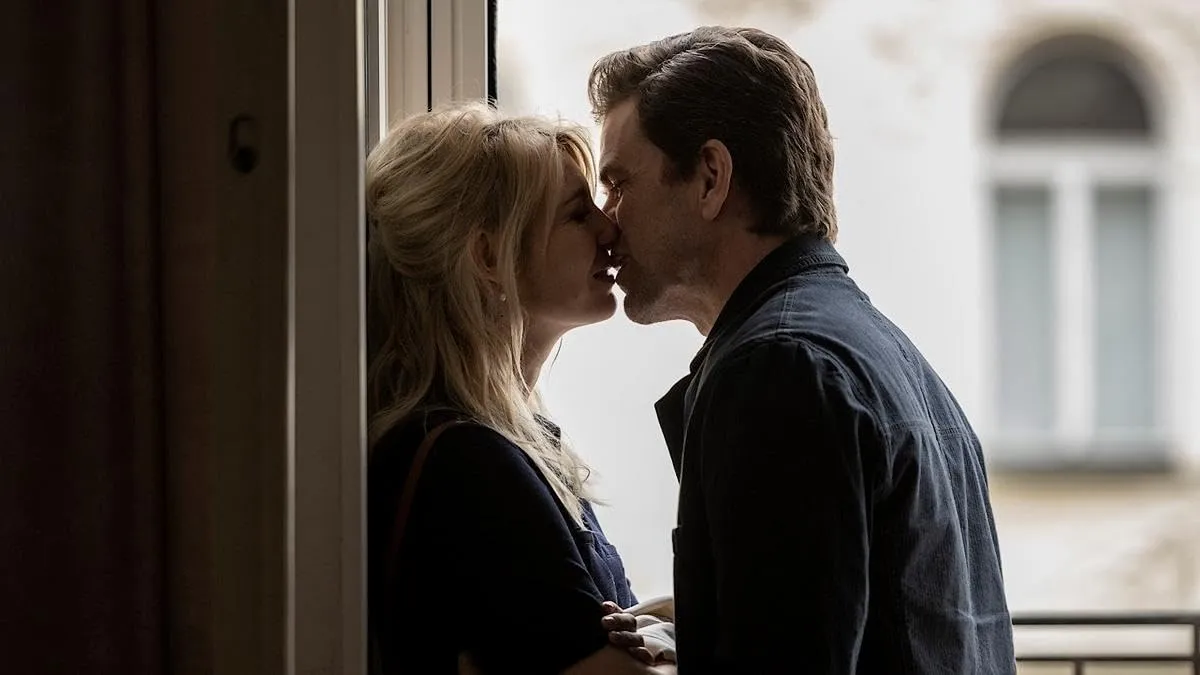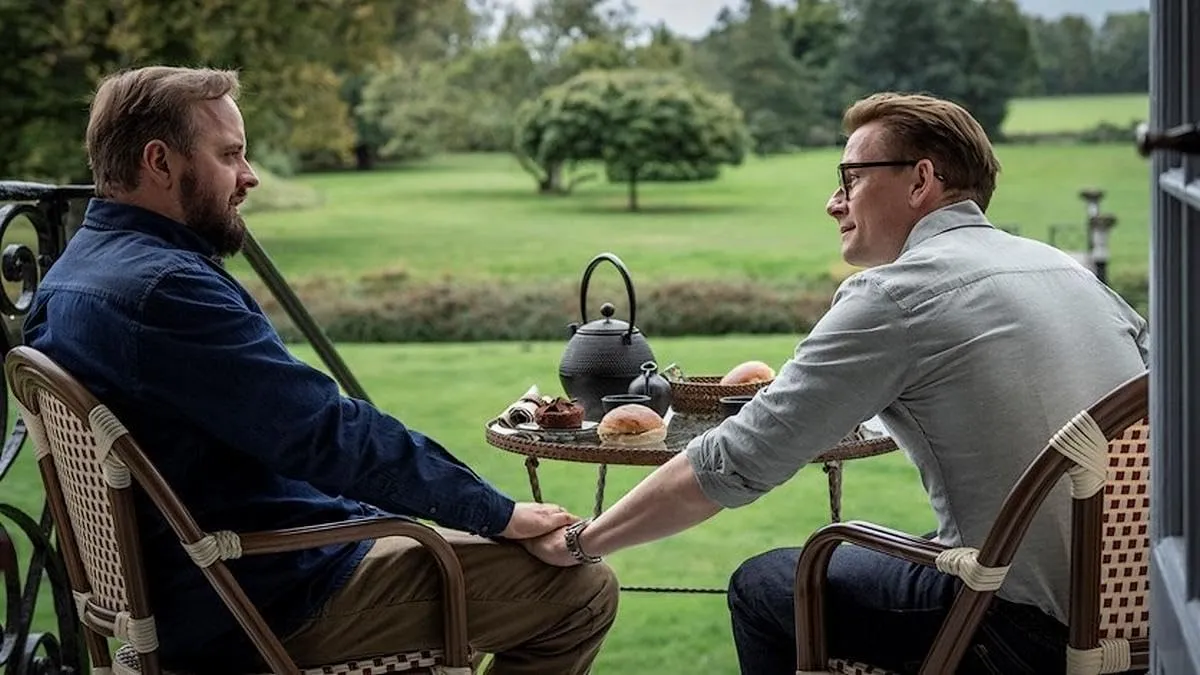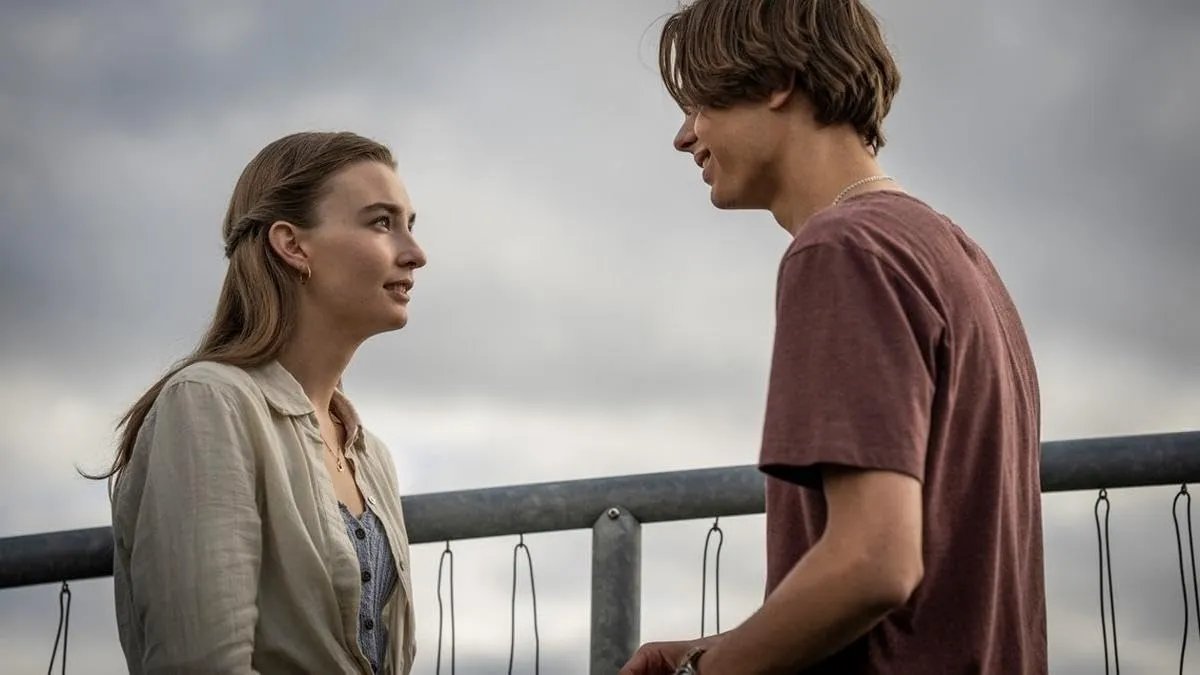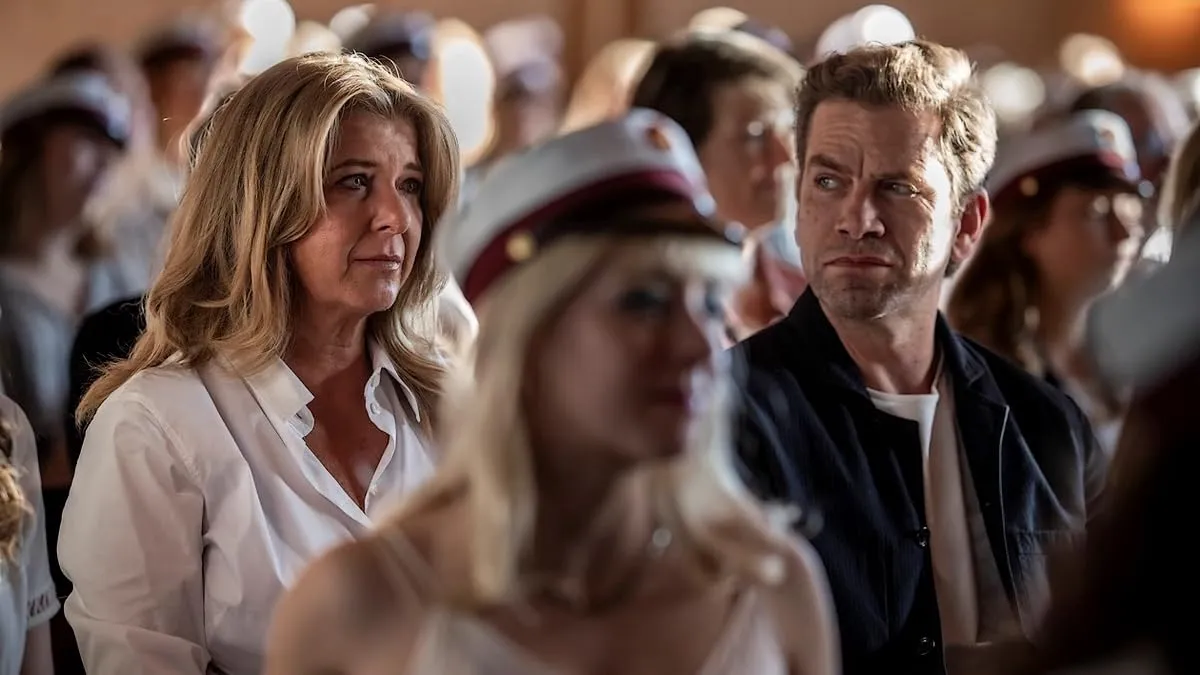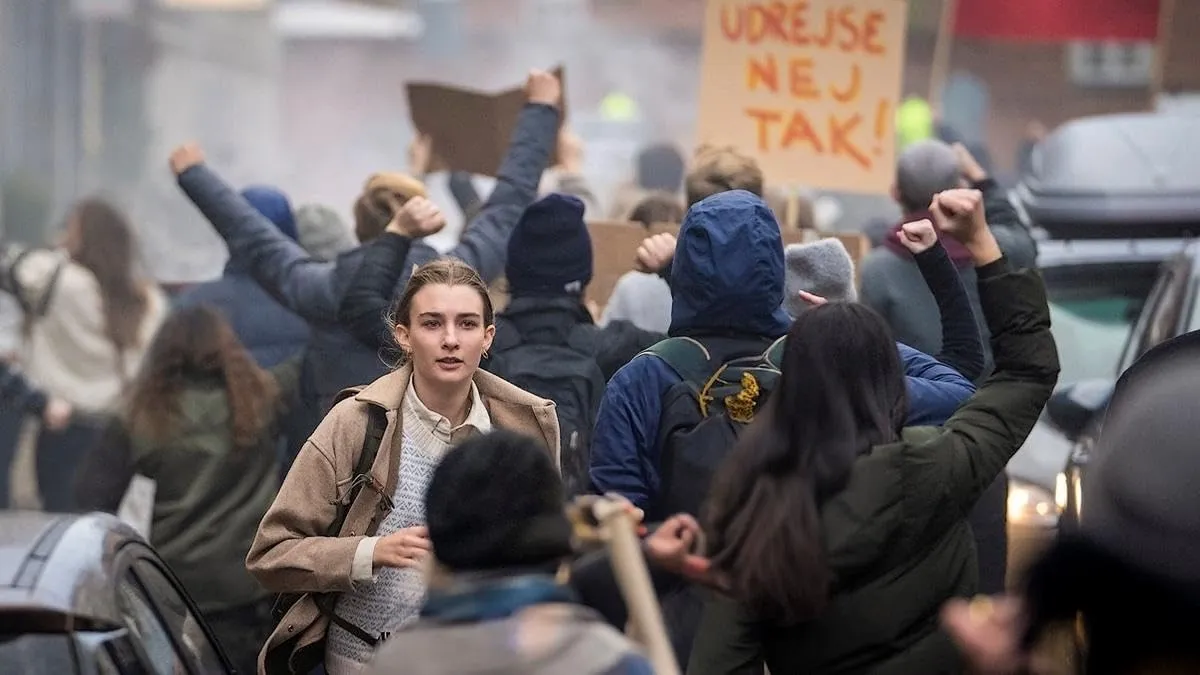As sea levels gradually rise due to climate change, an entire country faces evacuation in director Thomas Vinterberg’s new miniseries Families Like Ours. Premiering to acclaim at the prestigious Venice and Toronto film festivals, the show paints a vivid portrait of what forced mass migration might look like in the not-so-distant future. With his signature blend of intimate characterization and broader themes, Vinterberg draws us deeply into the intersecting stories of a few ordinary Danish families uprooted by the impending closure of their homeland.
The spiraling environmental crisis has progressed to the point where continued habitation in Denmark is no longer feasible. In a realistic stroke, the practical government rolls out a large-scale relocation program to find new homes for its citizens abroad over the course of six months.
Meanwhile, the global community shuts its doors even further to “refugees, immigrants, and families like ours.” At the dynamic heart of Vinterberg’s layered human drama are two women: Laura, a thoughtful teenager torn between her divorcing parents, and her friend Elias, who will stop at nothing to stay by her side despite being separated.
Through focused storytelling that brings climate change’s overwhelming stakes down to an intimate scale, Families Like Ours offers a glimpse into possible worlds where slow-onset disasters displace millions. A timely work from a master Danish auteur, this miniseries profoundly depicts the personal struggles immigration and bureaucracy impose on ordinary people facing extraordinary upheaval.
The Evacuation of Denmark
At the heart of Families Like Ours is Laura, an 18-year-old whose world is turned upside down when the Danish government announces its plan to evacuate the entire country. With rising sea levels threatening to engulf the low-lying nation, a mass relocation must take place over the next six months.
Laura lives with her mother Fanny but keeps close ties with her father Jacob, an architect, and his new family. When the evacuation begins, Jacob is offered a job in Paris, which could secure visas for him, his wife Amalie, and his young son. But Fanny, a homemaker without career skills, is scheduled for relocation to Bucharest.
Torn between her parents, Laura also faces the difficult choice of where to relocate herself. She’s fallen for her classmate Elias, but his family has connections in Finland that may lead them to separate. Making matters more stressful, Elias vows to stay by Laura’s side no matter what.
As the months pass, we watch the evacuation process unfold in a realistic yet orderly “very Nordic” manner. People fill out forms, attend Resettlement Ministry briefings, and bid farewell to loved ones, unsure if they’ll ever see one another again.
Laura struggles to decide between her mother in Bucharest or father in Paris. Her indecision strains both relationships and impacts the plans of those around her. Conflict arises within families as personal interests clash with the huge undertaking unfolding across Denmark.
By the finale, the country has been emptied. But through it all, the epic romance between Laura and Elias remains the emotional core as their desperation to stay connected tests both love and endurance in the face of major upheaval.
Masterful Direction Among Ordinary Lives
Director Thomas Vinterberg brings his masterful touch to Families Like Ours, balancing the series’ immense scope with tangible human stories.
He presents the months-long evacuation of an entire country with impressive verisimilitude, realistically depicting bureaucratic meetings and the drab offices that become so central to people’s futures. Despite focusing on just a few average families, Vinterberg makes Denmark’s immense undertaking feel vividly real.
The breathtaking cinematography, at times capturing crowded docks and protests but also intimate familial disputes, puts the viewer right alongside the characters. Production design transforms mundane locations into settings capturing the peculiarly Danish ambiance. Subtle details, from road signs to landscapes, immerse us deeply in this sinking nation’s final chapters.
Amid such grand themes, Vinterberg locates humanity in small, stirring moments that are equally impactful. From hushed goodbyes to a neighbor’s ominous hand gesture, subtle sacrifices and politics are revealed. He directs with a deft, tender touch that brings complex emotions to the fore through even a single facial expression.
At the heart of the show are two remarkable young performances. Amaryllis August carries much of the narrative weight as the layered, evolving Laura torn in countless directions. Albert Rudbeck Lindhardt imbues Elias with a fiery determination and youthful charm that makes their doomed romance so compelling.
Backing them is a top-caliber cast of Danish acting giants, from Paprika Steen to Nikolaj Lie Kaas. All deliver enormously moving portrayals that feel deeply authentic, transporting even sensational plotlines.
Under Vinterberg’s masterful guiding hand, Families Like Ours immerses us in a society’s upheaval while maintaining an intimate focus on the extraordinary experiences of ordinary lives.
Climate Change Has No Borders
One of the pivotal roles Families Like Ours plays is demonstrating how the effects of climate change can displace anyone, regardless of social status. While the show’s refugees might seem more fortunate than most, escaping Denmark reveals the hardships all face when becoming a “climate refugee.”.
At the story’s heart is Laura, who comes of age amid this crisis. Forced to choose between two homes and parents, she embarks on a challenging arc that illustrates how refugees are torn from what’s familiar. We feel her distress at losing control of her future while dependencies on others multiply.
Beyond Laura, the show intricately portrays intersecting stories within one extended family. His brother Nikolaj and husband Henrik face their own hurdles as their safe home dissolves. Their story, exploring unity in displacement, provides glimmers of hope amongst the difficulties.
On a grander scale, Families Like Ours addresses how climate change impacts all humanity. It strips away borders, sometimes splitting what should not be divided. While disruption reigns, the show still finds room for more uplifting themes.
Through their epic will-they-won’t-they romance, Laura and Elias demonstrate how love can persist against any obstacle. And in smaller kindnesses like a neighbor’s farewell gesture, we see spirits of compassion that persist even in crisis. Families Like Ours illuminates common bonds that transcend borders—and a shared stake in protecting our imperiled world.
When storytelling gets in the way of story
Families Like Ours tells an immensely moving tale that had me firmly in its grasp. The show deserves praise for bringing climate issues to vivid life through compelling character journeys. However, it must be said that an unnecessary reliance on dramatic fakeouts occasionally undermined the grounded storytelling.
Laura’s wavering over whether to follow her father or mother made for stressful viewing, as did the tendency to present each development as final and life-changing. While exploring difficult situations people may face, Laura flipped between major decisions too readily, straining credibility.
It’s understandable the desire to continually heighten stakes. But injecting extra conflict where none was needed diluted the authentic emotional impact. Laura’s agonizing over choices already presented ample drama without resorting to manipulation.
The show largely succeeds in feeling grittily real through small, poignant moments. But forced reversals seemed to exist more for their own sake than out of organic character motivation. This lessens how personally we can relate to the character’s journey.
Of course, the intent was honorable—illuminating immense issues through humanizing individual struggles. However, streamlining certain subplots may have allowed room for other stories to shine brighter. The romance could have felt more believably epic without these artificial bumps in the road.
In the end, Families Like Ours tells a profoundly worthwhile tale. But its message of shared humanity may have resonated more strongly had it trusted its natural strengths over theatrics. Sometimes less is indeed more when it comes to evoking authentic emotions.
Families Like Ours: A Call to Empathy
Beyond powerful storytelling, Families Like Ours achieves something far more valuable: forcing audiences to see themselves in the plight of “climate refugees.” In relocating affluent Danes, it shatters preconceptions of who deserves compassion in times of upheaval.
By dramatizing bureaucracy’s indifference to individual hardship, the series spotlights how policies impact real lives. And in following whites navigating restrictions faced by all migrants, it cultivates understanding that those deemed “other” often struggle with the same insecurities and heartaches.
Though set in a speculative future, the show underscores climate change’s very real consequences unfolding today. Towns already flood as seas rise, yet we continue prioritizing profit over planetary preservation. Families Like Ours demand we open our eyes to warnings from scientists and our hearts to the potentially massive displacement to come if change is delayed.
While not flawless, Vinterberg’s work bears witness to injustice with nuance and care. It illuminates shared vulnerabilities beneath surface differences. And in locating hope even amid desperation, the series leaves room for optimism—if societies will cultivate compassion and seek climate justice for all before it’s too late. Families Like Ours sounds like a call to recognize our planetary interdependence and to make decisions accordingly. Its message deserves widespread consideration.
A Storytelling Blueprint for Our Times
For all its imperfections, Families Like Ours remains an enormously powerful and important work of art. Director Thomas Vinterberg takes on massive themes with craft and nuance, all while keeping our hearts invested in ordinary people grappling with extraordinary upheaval.
The series never loses sight of very real issues afflicting our planet, from climate change to the indifference that greets so many refugees. At the same time, vivid characters and their emotional journeys make these urgent issues deeply personal. No matter one’s views, who couldn’t relate to Laura’s youthful longing for love and home amid social instability?
While perhaps manipulating emotions at times, Vinterberg’s intent was clearly to start difficult conversations and cultivate empathy. If certain plots feel manipulated, they also provoked self-reflection on complex themes affecting societies everywhere. Families Like Ours leaves us with indelible images and new perspectives well after endings roll.
For those drawn to thoughtful productions raising global issues through human stories, this miniseries deserves an audience. It presents a template for how climate change and immigration might be addressed in narrative form going forward—to both entertain and challenge preconceived notions in ways that stick. With a few tweaks drawing on its criticism, the next production could be even stronger.
Despite room for improvement, Families Like Ours gets so much right that it will likely influence climate-focused storytelling for years to come. Its ambitious tale of ordinary people facing unthinkable change demands to be experienced.
The Review
Families Like Ours
Families Like Ours delivers a profoundly moving yet imperfect portrait of social upheaval, with Thomas Vinterberg's masterful direction elevating vast themes of climate change and humanity's shared fate. While not without flaws, this timely miniseries cultivates understanding across perceived divisions at a moment when compassion and global cooperation are paramount.
PROS
- Powerful exploration of important climate and refugee themes
- Masterful direction balancing big issues and personal stories
- Timely work that challenges perspectives and cultivates empathy
- Terrific acting performances across the board
CONS
- Some subplot melodrama and emotional manipulation
- Main character Laura's decisions strain credibility at times.
- Potential for certain minor plots to be tighter









































